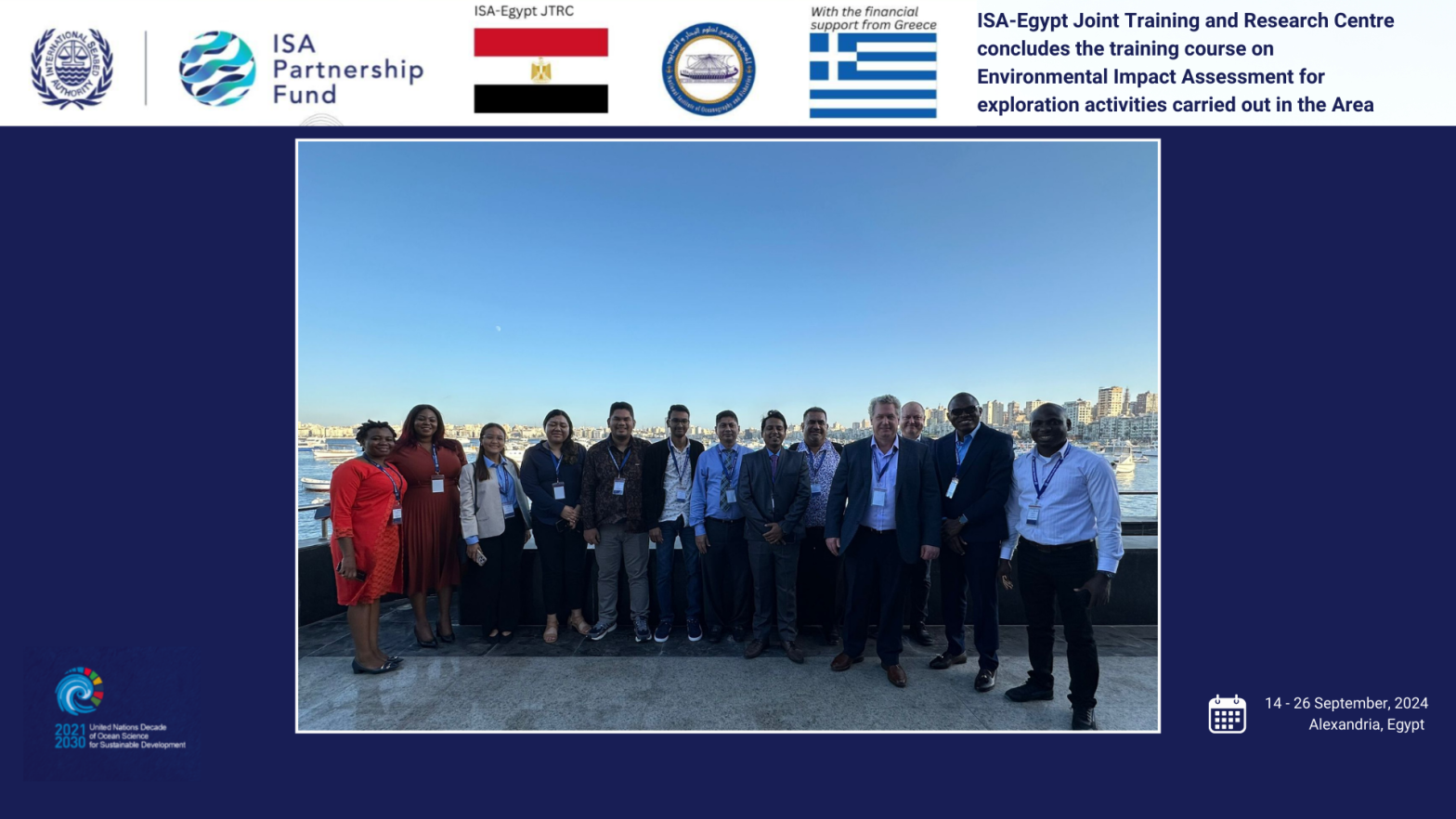Alexandria, Egypt – 26 September 2024 — The Secretariat of the International Seabed Authority (ISA) successfully concluded the first-ever environmental impact assessment (EIA) training course for exploration activities carried out in the international seabed area (the Area). The two-week course, held from 14 to 26 September 2024 at the ISA-Egypt Joint Training and Research Centre (JTRC) in Alexandria, Egypt, brought together 18 national experts from 12 different Member States, selected among more than 130 applications received. Among the successful participants, one was a national of a least developed country, three from Big Ocean States and six were women.
The training course, funded by a grant allocated by the ISA Partnership Fund (ISAPF) and Greece, is part of the broader ISA-Egypt JTRC programme of activities targeted at enhancing developing technical and managerial capacities for national experts in the field of deep-sea research, laboratory samplings and analysis, mineral resources assessment and the use of high-skilled technology and processing of data.
The ISA-Egypt JTRC was established in January 2024 through the signing of the memorandum of understanding between ISA and the National Institute of Oceanography and Fisheries (NIOF) of Egypt in line with the decision of the Assembly adopted during the twenty-eighth session (ISBA/28/A/13).
Over the two-week intense training, structured around in-depth studies, lectures, case studies, research and analysis, participants were able to gain an enhanced understanding of ISA’s regulatory framework and guidelines in the field of EIAs. Of particular importance were the skills acquired in baseline data-collection, impact analysis and mitigation strategies tailored explicitly for deep-sea environments. The training also focused on strengthening participants’ capacity for reviewing and providing feedback on exploration environmental impact statements, using lessons learned among diverse industry sectors and the four EIAs conducted in the Area so far.
Specific attention was also given to training participants in stakeholder engagement and public consultation processes in the context of deep-sea exploration and building their knowledge and expertise in creating environmental monitoring and management plans.
The ISA Secretary-General underscored the importance of the multi-stakeholder collaboration leading to this groundbreaking training initiative during the high-level segment of the closing ceremony of the training course. “This training course represents a significant step forward in our efforts to ensure the sustainable management of deep-sea resources for the benefit of humanity. By implementing tailored initiatives such as this one to build and develop the capacity of national experts from interested Member States, particularly developing States, ISA offers concrete and practical solutions to empower countries in making the best informed decision in support of a responsible approach to all activities carried out in the Area,” the Secretary-General said.
H. E. Ioannis Pyrgakis, Consul General of Greece in Alexandria, emphasized the importance of this initiative. “We are delighted that the contribution of Greece to the ISA Partnership Fund has materialized into the development of this important initiative. A full understanding of EIA principles and the procedures and methodologies to evaluate potential environmental impacts from activities in the Area is of the utmost importance for the protection of vulnerable deep ocean ecosystems,” Mr. Pyrgakis said.
Reflecting on the many months of efforts and work needed to deliver this training, Professor Amr Hamouda, President of the Marine Hazards Mitigation Centre at the NIOF of Egypt, emphasized the tangible impact the activities will have among the different countries having participated. Professor Hamouda also extended his congratulations to all the participants. “I am delighted to see the first activity under the ISA-Egypt JTRC taking place in Alexandria completed at the premises of NIOF. With a two-week intensive learning experience, it proved to be successful in empowering the most brilliant minds around the world by equipping them with the skills and knowledge necessary to ensure the sustainable development of the Area and its mineral resources.”
In praise of the collaborative spirit the training programme fostered, Prof. Hamouda added, “I am grateful for the support provided by the ISA Partnership Fund and look forward to developing new activities to further extend the understanding of the deep-sea.”
“I am convinced that our partnership through the ISA-Egypt JTRC will continue to play an essential role in fostering innovation, capacities and knowledge in the region and beyond,” he concluded.
As the ISA continues to deliver against its Strategic Plan 2019-2025 and associated High-Level Action Plan, initiatives like this training course and establishing regional JTRCs embody the ongoing commitment of ISA, its Member States and partners towards meaningful activities addressing the need and priorities of developing States as identified by them while empowering a new generation of leaders and experts.
About ISA
The International Seabed Authority (ISA) is an autonomous intergovernmental organization mandated by the United Nations Convention on the Law of the Sea to control and manage the mineral resources of the seabed beyond national jurisdiction for the shared benefit of humankind. ISA is committed to the principle that all economic activities in the deep seabed, including deep-seabed mining, must be regulated and responsibly managed using the best available scientific evidence for the benefit of all nations of the world. ISA works to ensure that the voices of all States, including developing States and other stakeholders, are effectively heard in discussions around the sustainable development of the deep seabed.
For media enquiries, please contact:
Mr. Philip Janikowski, Communications Specialist, ISA, pjanikowski@isa.org.jm


